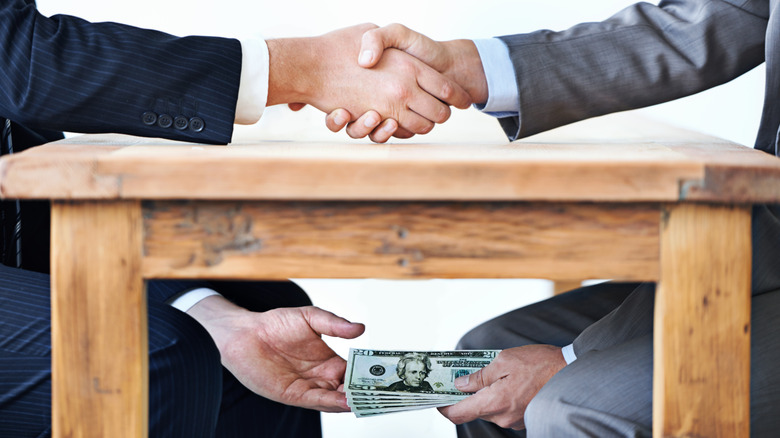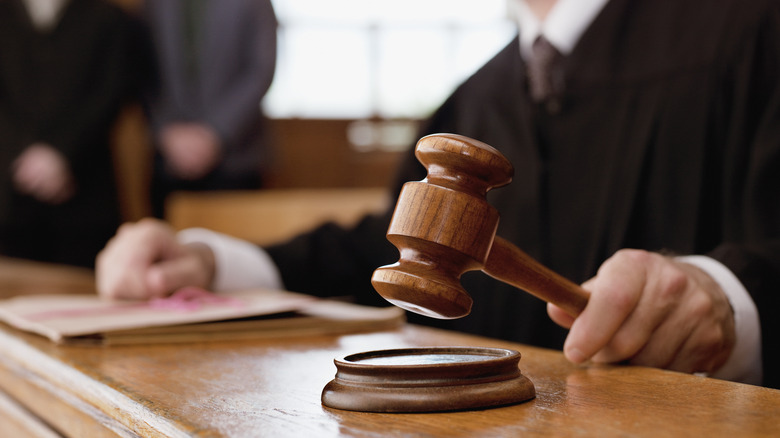What Is Racketeering (And Why Is It Called That)?
"What a racket!" Many of us have likely said or heard this during our lives. Used in that way, "racket" is a general term indicating some kind of untrustworthy, manipulative, or exploitative business dealing. So that one time you bought a Universal Studios Super Extra Plus-Plus Gold Family Season Pass Pack or whatever? And it only let you cut the line five times a day, and only for those lame rides that no one really likes? What a racket!
In reality, a "racket" was once a historically specific, mafia-like criminal dealing dating back to the 1920s, as the Online Etymological Dictionary says. We've got protection rackets, intimidation rackets, extortion rackets, and so forth, all for the purpose of squeezing someone for money. This makes a "racketeer" a criminal who engaged in a racket, not to be confused with "The Rocketeer" — that 1991 movie that you totally forgot about. As the Online Etymological Dictionary quotes the Brooklyn Daily Eagle from 1928, "A racketeer is nothing more nor less than a gangster who has organized thuggery along business lines."
In a modern sense, criminal racketeering isn't too different from this old definition, and might even be broader. Investopedia defines racketeering very generally as "the act of acquiring a business through illegal activity, operating a business with illegally-derived income, or using a business to commit illegal acts." This means that racketeering is a term that encompasses a whole bunch of other, more specific crimes like bribery, money laundering, robbery, extortion, and more.
The RICO Act tackles racketeering
Investopedia overviews the types of crimes that fall under the racketeering umbrella. In the U.S. these crimes get separated into state and federal-level activities. State racketeering offenses include, "murder, kidnapping, gambling, arson, robbery, bribery, extortion, dealing in obscene matters, and drug crime," while federal racketeering offenses include, "bribery, gambling offenses, money laundering, obstructing justice or a criminal investigation, and murder for hire."
Things get complicated when we turn to The United States Department of Justice Manual, Title 9, Organized Crime and Racketeering. Sections include discussions of when to indict someone on racketeering charges, when racketeering crimes involve state vs. national judiciaries, which kind of violent crimes are prosecutable in relationship to racketeering (e.g., murder, kidnapping, maiming, assault), and lots of information regarding procedural aspects of prosecution.
Most critically, racketeering in the United States was addressed via its 1970 RICO (Racketeer Influenced and Corrupt Organization) Act. Herman Law, P.A. very handily breaks down the RICO Act, including its original goal of being a kind of mafia-busting tool. Before RICO, crimes could only be prosecuted on a one-by-one basis, and couldn't be tied together through any overarching case that addressed larger criminal enterprises. As the reader can imagine, this would have made it very difficult to take down such enterprises. RICO, however, is designed to allow prosecutors to tackle all levels of a criminal organization, from the street thug all the way to the big boss sitting behind a mountain of cash at his desk.
Making a racket in the streets
Even though the terms "racket" and "racketeering" go back to 1920's criminal dealings, "racket" stems from much earlier slang circa 17th-century England. Like its modern use, the slang is connected to criminal activity, and also relates to our other use of the word racket, i.e., "to make a racket," or to be noisy. As a discussion thread on the English Language and Usage Stack Exchange describes, "racket" was originally an onomatopoeic word — a word that resembles a sound, like "bang," "crack," or "whack." It was used to describe a common ploy used by pickpockets, where members of a criminal group would make a noise or cause some trouble in the streets to distract passersby. When folks' attention was directed towards the commotion, and maybe their heads turned, pickpockets would swoop in and nick people's possessions.
From there, it wasn't long before a "racket" generally referred to criminal activity, most often of the petty variety. It took until the early 1800s for the word to show up in print. 1823's Grose's Classical Dictionary of the Vulgar Tongue – a title that indicates that the book sought to distill slang into written form — describes a racket as "some particular kinds of fraud or robbery." It also mentions that the word "racket" relates to "rig," slang for a game. As for why the term took off in the 1920s, the English Language and Usage Stack Exchange suggests that we've got Prohibition (1920 to 1933) to thank.


